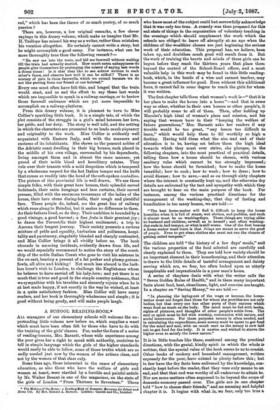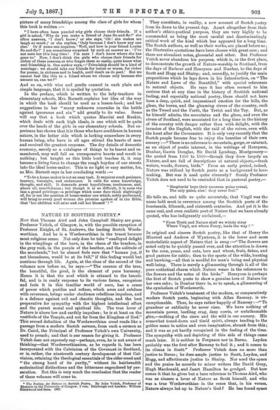A SCHOOL BEADING-BOOK.*
ALT, managers of our elementary.schools will welcome the un- pretending little volume now before us, which supplies a want which -must have been often felt by those who have to do with the training of the girls' classes. For, under the form of a series of reading-lessons, Mrs. Barnett, whose wide experience among the poor gives her a right to speak with authority, contrives to tell in simple language which-the girls of the higher standards would easily be able to follow, some of those troths which are so sadly needed just now by the women of the artisan class, and not by the women of that class only.
Some time ago, those interested in the cause of elementary education, as also those who have the welfare of girls and women at heart, were startled by a foreilaleard painfulartiele by Mr Walter Besant in one of the magazines, on the state of the girls of London "From Thirteen -to Seventeen." Those • rho of Ma Home: a Reading-Moab of Dentedia atfonamy for &hoot and Home Use. By Mrs. Samuel A. Barnett. London Cassell and Co., Lirolted. who knew moat of the subject could but sorrowfully acknowledge that it was only too true. A remedy was then proposed for this sad state of things in the organisation of voluntary teaching in the evenings which should supplement the work which the schools 'are obliged to leave off abruptly at an age -when the children of themealthier classes are just beginning.the serious work of their education. This proposal has, we believe, been taken up, and doubtless much good will result .from it. But the work of training the hearts and minds of these girls can be begun before they reach the thirteen years that place them beyond the control of the School-Board officer, and a moat valuable'help in •this work-may -be found in this little reading- boolr, which, in the hands of a wise end earnest teacher, may become a great influenoefor good. Even without this-additional force, it eannot-faiTin some degree to reach the girls- for whom it was -written.
The first chapter tells them what woman's work is--" that it is her place to make the house into a home "—and that in some way or other,- whether in_their own houses or other people's, it will probably -come -to all of them. Then, after holding up Mazzini's high ideal of woman's place and mission, and his saying 'that -women have in their "keeping the welfare of future generations," 'Mrs. 'Barnett 'asks her readers if any trouble would 'be too great, "any lesson 'too difficult to learn," which would help them to fill -worthily so high :a destiny. Having told them what -the aim and end of their education is to be, having set before them the high ideal towards which they must ever strive, she plunges, in the following chapters, into the most practical of practical details, telling them how a house should be chosen, "with various sanitary rules which cannot be too -strongly impressed,; -how the home should be -furnished ; how to make the home beautiful ; how to cook ; how to wash ; how to dress ; how to avoid disease ; how to save,—and so on through- sixty chapters where 'the interest is constantly kept-up, and the otherwise dry details are enlivened by the tact ardsympathy with which they are brought to hear on the main purpose of the book. For instance, among the various 'practical directions 'for the management 'of the washing-day, that -day Of fasting and humiliation in too many-homes, wean told :— " The beet home-maker will find it difficult to keep the Image homelike when it is full of steam, wet clothes, and puddles, and such it almost must be on .washingdays. These things are trying alike do husband and children, atowell as to herself ; and often washing- day endsin bad temper, or what is still worse. One of the first lessons a home-maker meat learn is that things are meantto serve the good of people. Even to get clean clothes-she must not run the chance of getting soiled tempers"
The children are told "the history of a 'few days' meals," and the various properties of the food selected are carefully and clearly explained to them. 'They are told how variety should be an important element in their housekeeping, and their attention is drawn to the little details of taateful arrangement and dainty serving which are, we fear, too often looked upon as utterly inapplicable and impracticable in-a poor man's home.
A series of chapters deals with what the writer calls the " Seven Golden Rake of Health," and in' them many important facts about food, heat, cleanliness, light, and exercise are taught. In a chapter on "-Saying 'Money," we are told In planning the layiog.ont of the wage or income, the home- maker most not forget that those for whom she provides are not only bodies, but that every one has other • parts of their natures which want foodas mush as the body. The mind mast be fed with books, sights of pictures, and thoughts of other Jaeople'sitoble lives. The soul or spirit must be fed with worship, communion with nature, and social intercourse. For these purposes money is often needed, and in calculating the expenditure,some money must be spent to get foist for the mind and soul, with as -much care as the money is now laid out toget food for the body. It is unwise and wicked to starve the higher even to satisfy the lower nature."
It is in little touches like these, scattered among the practical directions, with the genial, kindly spirit in -which the whole in written, that the special value of the book seems tons to consist. Other books of cookery and household management, written expressly for the poor, have existed in plenty before this ; but in few have the dry facts been enlivened by the knowledge, con- stantly kept 'before the reader, that they were only means to an end, and that that end was worthy of all endeavour to attain to. Nor are some matters often supposed to be beyond the scope of domestic economy passed over. The girls are in one chapter told " how to choose their friends," and an amusing and helpful chapter it ie. It begins with whatis, we fear, only too true a
picture of many friendships among the class of girls for whom this book is written :—
" I have often been puzzled why girls choose their friends. If a girl is asked, Why do you make a friend of Jane So-and-So?' she often answers, don't know;' or she says, ' Oh ! she makes me laugh so mush;' or she replies, Only because I don't know any one else.' Or if some one inquires,' Well, and how is your friend Louisa So-and-So?' I am sometimes surprised by each an answer as : 'I've not seen her this long time ! I'm sure I don't know where she has gone to.' Now, I don't think the girls who choose their friends for either of these reasons, or who forget them no easily, quite know what real friendship ie. One author sayer= Friendship should be a kind of marriage we should take our friends for better or worse, for richer for poorer, in sickness and in health, until death us do part.' But we cannot feel like this to a friend whom we choose only because she amuses no, can we P"
And no on, with wise and gentle counsel in such plain and simple language, that it is spoiled by quotation.
In the preface, which is written to the lady-teachers in elementary schools, Mrs. Barnett explains her idea of the way in which the book should be used as a lesson-book ; and her suggestions to her "many unknown comrades in the battle against ignorance and sin" add greatly to its value. Some will say that a book which quotes Mazzini and Ruskin, which deals with such high ideals, is one which will be quite over the heads of the girls in our elementary schools. But ex- perience has shown that it is those who have confidence in human nature, in the better side which is lurking somewhere in every human being, who have in all ages stirred the hearts of men and received the greatest response. The dry details of domestic economy, merely as a catalogue of things to be learnt and re- membered, may well fall on unresponsive hearts and result in nothing ; but taught as this little book teaches it, it may become a living force to change the rough hoyden of our streets into the ideal home-maker. This is no light or easy matter, for, as Mrs. Barnett says in her concluding words :— " To be a home-maker is not an easy task. It requires much patience, bravery, foresight, and endurance. It calls for some knowledge, thought, and skill. It demands great hopefulness, tenderness, and, above all, unselfishness ; but though it is so difficult, it is none the less a grand privilege—a privilege which none dare think slightingly of, for is not the position of home-maker one which, nobly performed, will bring to every good woman the promise spoken of in the Bible, that 'her children will arise and call her blessed' ? "



































 Previous page
Previous page